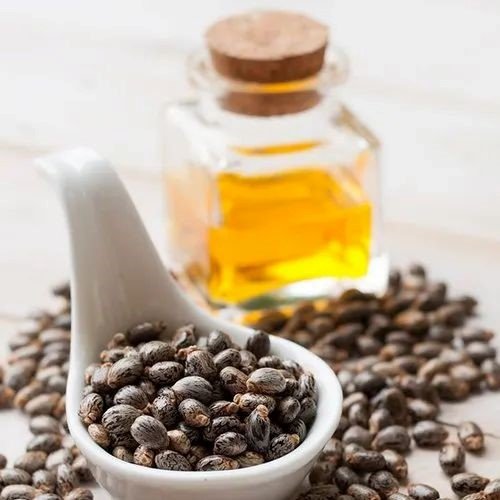
Technical Specifications:
CAS NO : 8001-79-4
Synonyms : Ricinus communis, Vegetable Oil, Cosmetol
Molecular Weight: 933.4
Molecular formula: C57H104O9
Boiling point is 313 °C (595 °F)
Density: 0.961 g/cm3
Solubility: less than 1 mg/mL at 68° F
Product Description
Castor oil is a popular industrial product that is derived from the castor bean plant. It is widely used for its various applications in the manufacturing sector, including lubricants, coatings Technical Details of Castor Oil.
Castor oil is a pale yellow vegetable oil that is obtained from the castor bean plant, scientifically known as Ricinus communis. It is a triglyceride in which nearly 90% of fatty acids are ricinoleic acid, an unsaturated omega-9 fatty acid. The oil is extracted by crushing the castor beans, followed by the process of pressing or solvent extraction.
The composition of castor oil may vary depending on the region and the method of extraction. Generally, it contains the following fatty acids:
Ricinoleic acid (85-95%)
Oleic acid (2-6%)
Linoleic acid (1-5%)
Palmitic acid (0.5-1.5%)
Stearic acid (0.5-1.5%)
Applications of Castor Oil
Lubricants: Castor oil is widely used as a lubricant in various industries, including aviation, automotive, and machinery. Due to its high viscosity and lubricity, it is an ideal option for lubricating heavy machinery, gears, and bearings.
Cosmetics: Castor oil is a common ingredient in various cosmetic products, including soaps, lotions, and shampoos. Due to its emollient properties, it is often used in skincare products to moisturize and soften the skin.
Pharmaceuticals: Castor oil has been traditionally used as a laxative to relieve constipation. It is also used in various other medications, including pain relief, anti-inflammatory, and anti-fungal drugs.
Coatings: Castor oil is used as a coating material for various surfaces due to its water-repellent properties. It is commonly used in paints, varnishes, and other coatings.
Adhesives: Castor oil is an important component of various adhesive formulations. It is used to improve the adhesion properties of glues and other adhesive products.
Castor oil is a thick liquid that is rich in fatty acids that make it a perfect moisturizer. It also has propertieslike anti-bacterial, anti-oxidant & anti-inflammatory that heals, cleans & removes scars. It is used in the cosmetic industry & in medicines.
Castor Oil is a 100% naturally cold pressed, unrefined, chemical free, hexane free, additive free, and rich in vitamin E and minerals – making it the top choice of castor oil for hair. This oil deeply moisturizes and conditions hair, adding strength and vibrancies thereby promoting healthy hair and controls hair fall.Also, it is known for black and dark hair which people desire to have it. Castor Oil is a vegetable oil pressed from the seeds of the castor bean, Ricinus communis. Castor oil has many industrial applications and is used medicinally as a laxative and as an excipient. Castor oil is a vegetable oil pressed from castor beans. It is a colourless to very pale yellow liquid with a distinct taste and odor ricinoleates. Oleate and linoleates are the other significant components.
Extraction: It is extracted by a combination of pressing & extraction.
Composition:Ricinoleic acid, oleic acid, linoleic acid, steraic acid &palmitic acid.
Uses:
· It is used as a natural moisturizer.
· It promotes wound healing.
· It has anti-inflammatory effects.
· It is used to reduce acne & blackheads.
· It keeps your hairs & scalp healthy.
Safety precaution:
· Avoid in pregnancy as it can cause premature delivery.
· Should be avoided by children.
APPLICATION
Castor oil is used to treat constipation. It may also be used to clean out the intestines before a bowel examination/surgery. Castor oil is known as a stimulant laxative. It works by increasing the movement of the intestines, helping the stool to come out. Use of castor oil as a laxative is attested to in the circa and was in use several centuries earlier. Although used in traditional medicine to induce labour in pregnant women, evidence that castor oil is effective in dilating the cervix or induces labour is insufficient. When applied to the scalp, it’s purported to enhance the health of the hair follicles and, in turn, promote hair growth (as well as protect against hair loss).
Castor oil and its derivatives are used in the manufacturing of soaps, lubricants, hydraulic and brake fluids, paints, dyes, coatings, inks, cold-resistant plastics, waxes and polishes, nylon, pharmaceuticals, and perfumes.Used in foods, beverages, perfumes, toiletries and cosmetics.
It is used to make plasticizer, dicarboxylic acid, polyurethane coating, rubber, adhesive, fatty acid, surfactant, insulating oil,hydraulic oil, lubricating oil, Turkish red oil, soap, polyamide-11 fiber, fatliquoring agent for leather, sulfated castor oil,extender and brightener for leather finishing, spices, penetrant and emulsifier in textile industry, etc. Castor oil was dehydrated to obtain conjugated double bond dry oil. Hydrogenation under different conditions can produce a variety of products, so it is widely used in various industrial fields.
Widely used for oil soluble perfume, bactericide, cooling agent, mosquito repellent, pesticides,sunscreen,a variety of animal and plant extracts Use for transparent water washing, cosmetics, daily necessities.

Conclusion
Castor oil is a versatile product with numerous applications in various industries. It is a popular choice due to its unique chemical properties, including high viscosity, lubricity, and emollience. As a non-edible oil, castor oil falls under the HSN code 15153090. Its demand is expected to increase in the coming years due to its growing applications in various sectors, including pharmaceuticals, cosmetics, and manufacturing, adhesives, and other products.
Castor oil is a thick liquid that is rich in fatty acids that make it a perfect moisturizer. It also has properties like anti-bacterial, anti-oxidant & anti-inflammatory that heals, cleans & removes scars. It is used in the cosmetic industry & in medicines.

